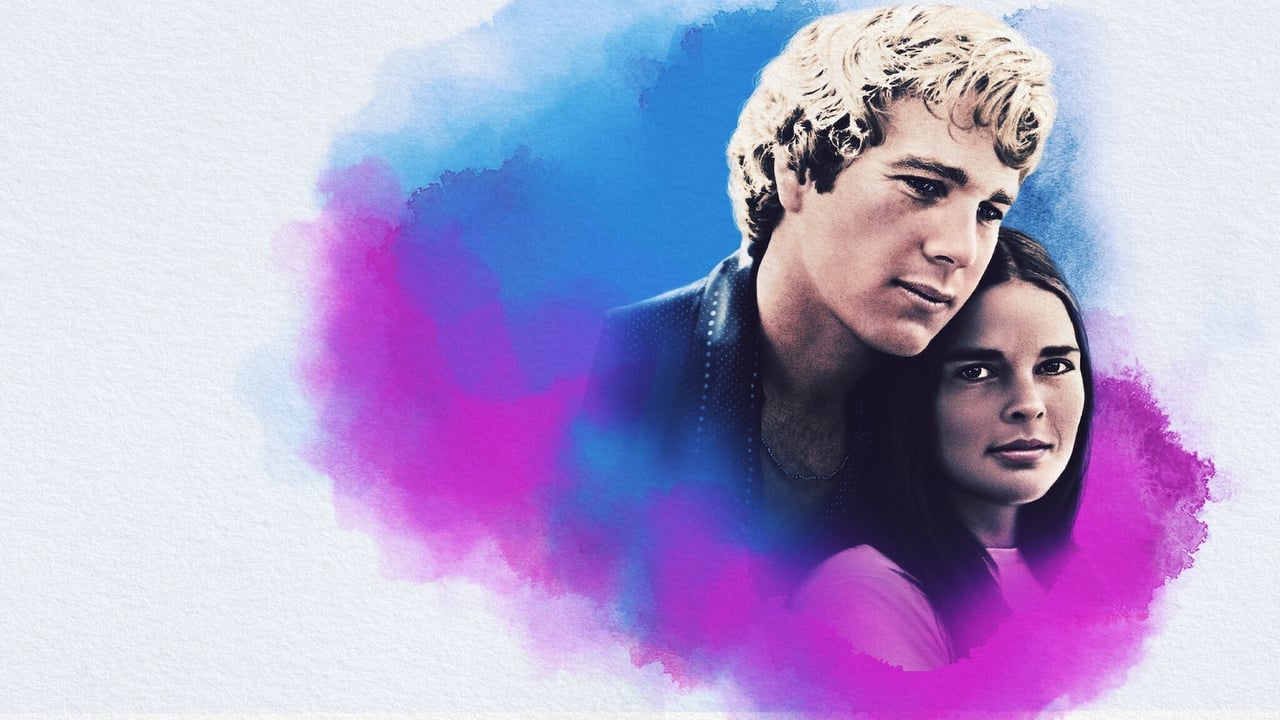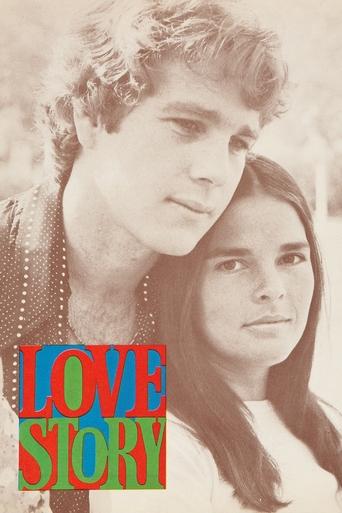



the audience applauded
A lot of fun.
The acting is good, and the firecracker script has some excellent ideas.
View MoreOne of the best movies of the year! Incredible from the beginning to the end.
View MoreThere, I said it. I'm sorry - and I HAVE to say it because I do not love this film, and I mean it. I saw Love Story when it first came out in 1970. I was 14 and I thought it was crap then. Foolishly I attempted a rewatch wondering if my youthful impressions were too harsh. They weren't. In fact, they weren't harsh enough. Thanks to IMDb I can now see that this film was singularly responsible for the four worst Academy Award nominations ever. They make the nominations of Mikail Baryshnikov and Leslie Brown for The Turning Point look serious. At least those two could dance. I would seriously like to know how someone with the talent deficit of Ali McGraw gets into any film, let alone one from a major Hollywood studio, and gets to star in it, is terrible, and then gets nominated for an Academy Award. Which usually means something. Doesn't it?
View MoreYouth have always masked their true intentions with heavy doses of sarcasm and insult. You see this in the playground, with juvenile crushes, and how it usually starts with some brash words to each other. I recall Todd Solondz's Welcome to the Dollhouse having a particularly piercing candid moment where this trope gets stripped away. In Love Story we find the same attractions, because they are still fresh- faced college students and not yet ready for the real world. They bristle at each other from two vastly different social classes, which have been decided because of the superficial details that we first notice about a stranger. Their words drip with disdain because they don't want to seem vulnerable. Naturally, this calls for a first and second date. It's all very cute, because we know they are attracted to each other and that they will invariably end up together. Annoyed, he asks why she is still interested in him after they have been at each other's throats, and smirking, she replies: "I like your body." This results in a stupid grin on Oliver Barrett IV's face. She has the same look, because she knows the hold she has over him (being a boy), but also because she isn't entirely being sarcastic. Then comes the expected honeymoon period, most often depicted with a gleeful montage of the couple unable to keep their hands off each other over some stirring song. Hiller does well to make it interesting; when Jenny first utters those fatal, all important three words, he cuts to Oliver falling backwards as if in a dreamy daze, while also doubling as a transition to their blissful play in the snow. There is also the unavoidable first meeting with the parents, and while the Barretts are every bit the stuffy, preppy stereotypes that Jenny initially disdains (he is less father and more military commander), Hiller has fun with it. It starts awkwardly, as expected, with everyone in the room perhaps already having cast their judgements. The polite small talk rips apart any last minute misgivings they might have; Barrett Senior inquires into which company her father runs, and she replies, unwavering: "Phil's Bake Shop." MacGraw's delivery of the line is excellent - she makes it funny, but without comprising herself by offering up the remark as something to be ashamed of. But what is really wonderful about this scene is the editing. It jumps back and forth between the awkward silence and the roar of the engine and Oliver's indignation afterwards. Initially it cuts away before a word is even spoken, because it can't bear the second-hand embarrassment of the scene, and recounts it from there. The cuts play with the dialogue, matching what shouldn't be matched, trying to make sense of it all when it is obvious that Jenny will not be an acceptable addition to the family. Do they have chemistry? It is something that is a must for any romance, and I think they do, in spite of how they might be polar opposites of each other in terms of personality. O'Neal retains that boyish solemnity that has him sometimes slip into frozen, emotionless deadpan (which is why he was a perfect fit for Barry Lyndon), while MacGraw basically shudders and gasps for air when she is upset. They have fun together, even as the issue of the class divide hovers in the back of his mind. It is the basis of their first major argument, and curiously something that is never explicitly resolved. It's like a skip in the record, where they whistle and hold hands and skip forwards in their relationship. Well, they are still young of course, and still trading little jibes. Preppy becomes a playful term of endearment - but MacGraw is good enough that it was already one in the first place, merely hidden behind those layers of wit and edge. If O'Neal has his boyish immaturity then MacGraw has this persistent nagging from the script to keep up a persona. It always demands that she speak with a smirk on her face, two sentences away from another playfully snide remark. This considerably lessens any impact that comes from discovering her fatal disease. Everything in Love Story is inevitable, right down to the ending being clumsily stuck to the beginning as a way of providing a ominous ticking clock that frames the romance. Hiller has a difficult job - the story comes with the significant baggage of the title, the poster and being the basis of a best-selling romance novel. There's even an annual screening for Harvard freshman to deride, mock and jeer at all it's gooey, sickening sentimentalism. But if you want to look past that there is quiet the poetic arc within. Oliver is forever attached by name to his family's reputation, so it must be agonising to have to return to his father for monetary assistance. He barely even listens to his wife, who chastises him for feeling sorry for holding her back from a more rewarding lifetime. In a way she is also alleviating the audience's concerns too; I was a bit wary of the way she flings her dreams into the air for an early marriage, but what could be more truthful than the words from her own mouth? This is the tragic dilemma of these situations, where the dead die happy and the living are left to mourn what could have been, even if they had done everything right.
View More"Love means never having to say you're sorry.". Supposed to be romantic, but in reality, sounds absolutely ridiculous. Love Story is the first gushy, mushy rom-com with a terrible ending. What I can say, positively, is the chemistry between Ryan O'Neal and Ali MacGraw. They play people that are hardly relatable, but their language of love is universal. Ali MacGraw is nearly the best thing about the picture. First of all, tell me she wasn't incredibly beautiful back in those days. The writing is also clever, in a Cameron Crowe kind of way.. despite allowing you to hate Ivy leaguers more than you already do. It suffers by being what it truly is. Along with one of the most annoying soundtracks of all time. "Theme from Love Story" is nails on a chalkboard bad. What you need to know, most importantly, is that time hasn't treated "Love Story" kindly, despite being so familiar and lovely in parts.
View MoreA silly, trivial film, "Love Story" cons too many of its viewers with its schlocky sentimentality and its idealization of the East Coast power elite. Still, it presents an interesting view of social attitudes prevalent in a 1970's Ivy League setting. "Love Story" tries to make an egalitarian nod towards an unlikely romance between a WASP scion and a poor but gifted Italian-American woman. At the same time, the film constantly glamorizes and glorifies the northeastern top-out-of-sight Anglo-American culture associated with Harvard. The beautiful cinematography evident throughout the film pays homage to Harvard and to east coast chic.Spoiler Alert:Oliver Barrett IV (Ryan O'Neal) rebels against his anally retentive and classist father (Ray Milland) by marrying Jennie Cavalieri (Ali MacGraw), a working-class Italian-Catholic woman from Cranston, Rhode Island. Quel horreur! While Jennie pretends to disdain preppies, her obvious fascination with their social power is evident in her emulation of their clothing styles and her preference for WASPy men. She even claims (somewhat ironically) to "love" the number after Oliver's name. During her meeting with his nauseatingly pretentious parents the usually blunt Jennie is charmingly demure, and nearly as smooth as Sydney Poitier in "Guess Who's Coming to Dinner." This is a romance motivated not so much by true love, as by mutual fascination with the Other from a different side of the tracks.Jennie's class crossover from proletarian Cranston to Preppieland may have been a major source of the film's romantic appeal, especially since the myth of "movin' on up" is cherished to an extreme in America.By my lights, Jennie Cavalieri makes a horrible mistake when she gives up a fellowship to study music in Paris with the acclaimed Nadia Boulanger. Instead, she falls for the oldest myth in the book by marrying Oliver Barrett, the quintessential bland corporate type from the "right" background. In the real world, unions between working-class types and preppies rarely work due to the snobbish attitudes of the latter. It is wiser for talented people from more modest backgrounds to gain entry into the upper classes through intellectual and artistic abilities that will give them staying power, rather than through marriage alone. Had Jennie gone to Paris to fulfill her dream of becoming a concert pianist, she not only could have realized her creative potential, but she also could have eventually married a man from a more culturally sophisticated and less class obsessed background than Oliver Barrett IV. This better spouse for Jennie would also have been more appreciative of her musical gifts.The ridiculous line, "love means you never have to say you're sorry" is the dictum of a spoiled and entitled richie who uses others for pleasure and profit. When Oliver throws this line at "Papa" after Jennie's death, this relieves the eminent Mr. Barrett of any responsibility for his vile snobbery. Oliver is welcomed back into the fold only after Jennie no longer exists as a threat to the Barrett family's WASPocracy.Fortunately in the post millennial world, a rich WASP man would not be viewed as the ultimate prize for a woman like Jennie Cavlalieri, since the current bourgeois bohemian culture in America would encourage her to seek other choices. Who knows? Perhaps Jennie's immune system had an aversion to Oliver's preppy sperm -- and this caused her fatal illness.
View More